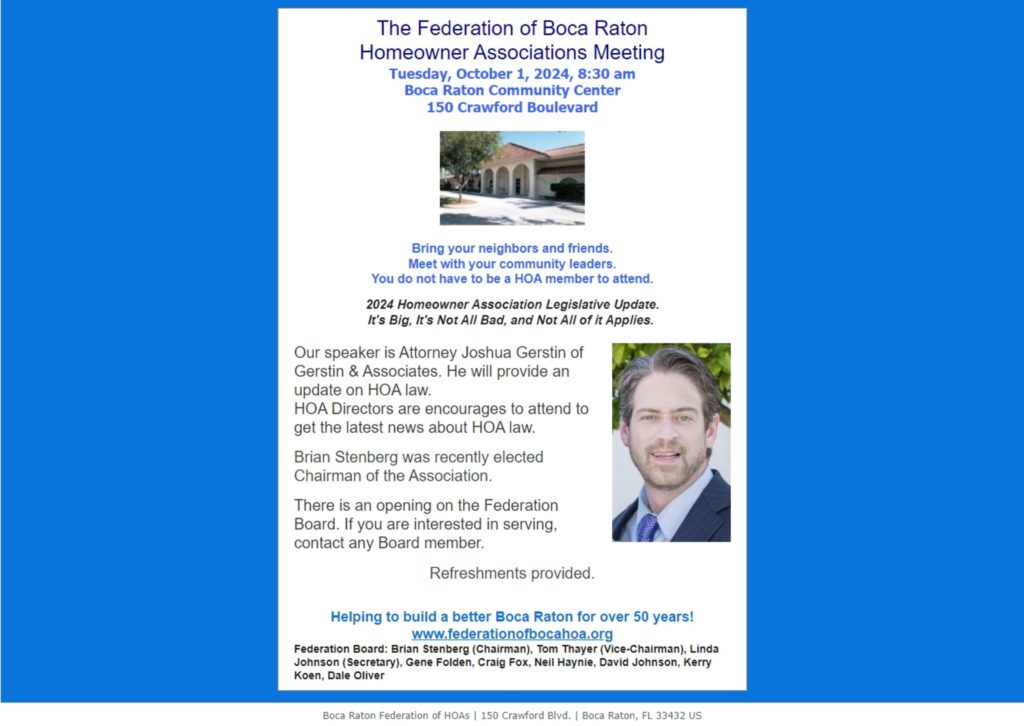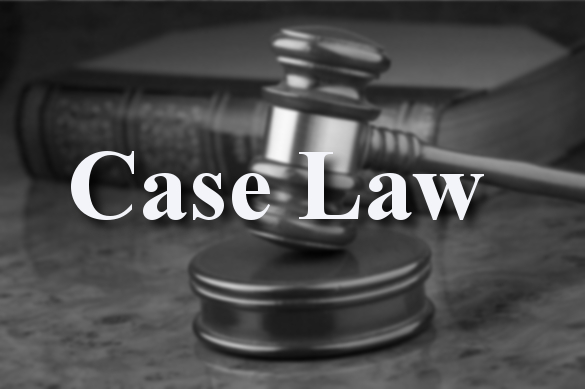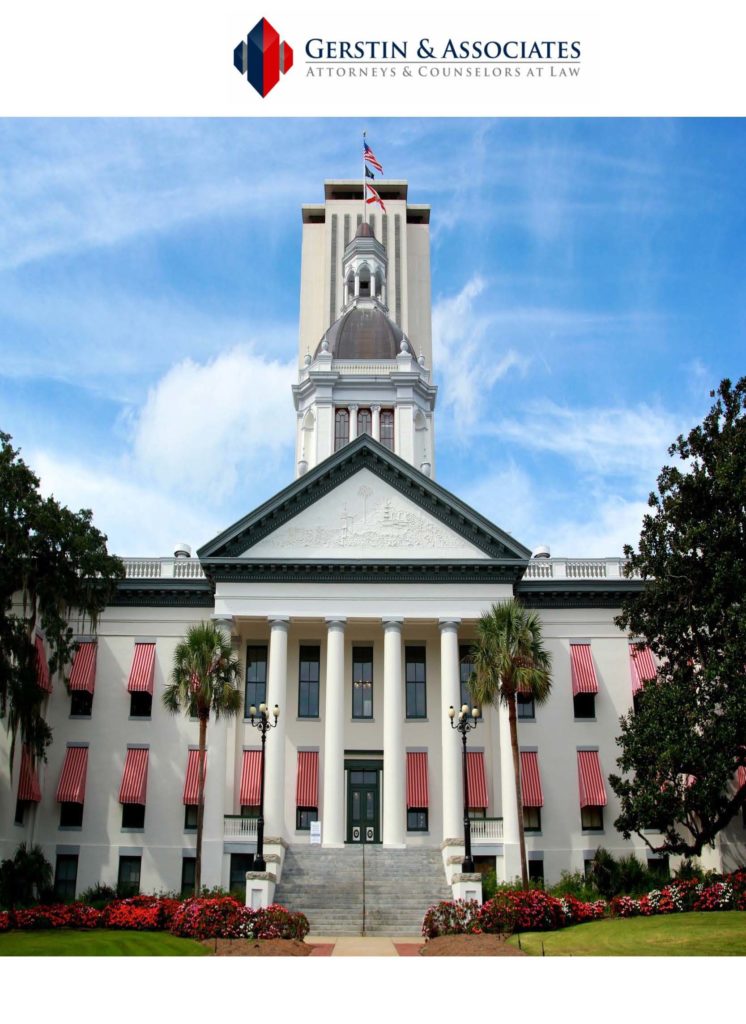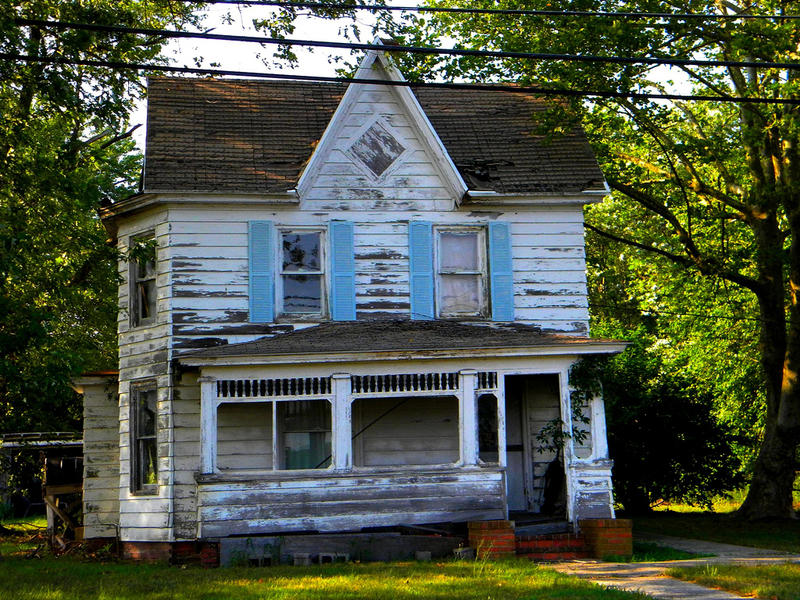The Do’s and Don’ts of Retrofitting your Community Association for Pickleball.

By: Joshua Gerstin, Esq.
Gerstin & Associates

By: Joshua Gerstin, Esq.
Gerstin & Associates


On June 9, 2023, Governor DeSantis signed the “glitch” bill to purportedly fix some issues with the recent “Surfside” related inspection law. The full text of the law is available here, and a .pdf of this article is available here. Unless otherwise indicated, this legislation takes effect immediately.
As with many legislative efforts, determining the effectiveness of the legislation and the discovery of unintended consequences takes time. At the very least, the changes to the Structural Integrity Reserve Study law (SB 154) listed below are a good start:
Reserve Funding:
Inspections:
Stay one step ahead of new legislation, recent case law, and new developments that may impact your community association by subscribing to the Gerstin & Associates newsletter.
 Based on a seemingly low media profile many people wrongfully assumed Florida’s court system had little or no impact on their community association in 2019. Although lacking in “name plate” cases the following case law decided in 2019 will have a meaningful impact on Florida’s condominium and homeowner associations (click here for .pdf of this article):
Based on a seemingly low media profile many people wrongfully assumed Florida’s court system had little or no impact on their community association in 2019. Although lacking in “name plate” cases the following case law decided in 2019 will have a meaningful impact on Florida’s condominium and homeowner associations (click here for .pdf of this article):
 2019 Florida Condominium & Homeowner Association Legislative Update
2019 Florida Condominium & Homeowner Association Legislative UpdateClick here for .pdf version of this article
Based on the seemingly low media profile of recently passed legislation pertaining to community associations, many people wrongfully assume the latest session of Florida’s legislature will have little or no impact on their community association. To the contrary, although lacking in “name plate” legislation, the following recently passed legislation goes into effect on July 1, 2019 (unless otherwise noted) and will have a meaningful impact on Florida’s condominium and homeowner associations:
HB 829 – Attorney Fees in Challenges to Local Ordinances. Thanks to HB 829 it is now easier for your community association to “fight city hall”. Attorneys’ fees awards are available to prevailing parties in lawsuit brought against a local ordinance that allegedly violates state or Federal preemptions. Click here for a copy of the new law.
HB 1159 – Tree Trimming. Other than mangrove trees, local governments cannot require a permit for pruning, trimming and removal of vegetation and trees, if the tree or vegetation is certified as presenting a danger by the International Society of Arboriculture. Local governments are also forbidden from requiring the removed trees or vegetation to be replanted. A property owner year-round can request an electric utility maintain vegetation on property adjacent to the electric utility’s right-of-way without notice or permission from the local government. This would only apply to situations when it is necessary for power restoration or when the vegetation is threatening to cause a power outage. Click here for a copy of the new law.
SB 82 – Vegetable Garden Preemption. Local governments are prohibited from regulating vegetable gardens on residential property. This prohibition does not apply to general regulations that are not specific to vegetable gardens, such as ordinances regulating fertilizer, water use and invasive species. Click here for a copy of the new law.
SB-1666 – Anchoring & Mooring. The legislation directs the Florida Fish & Wildlife Commission to study impacts of long term storage of vessels anchored and moored outside of mooring fields; create “no-discharge zones” for sewage dumping near certain waterbodies near rural areas; require boater safety identification cards for boats 10 horsepower and above; and designate a portion of registration fees collected by counties for the Marine Resources Conservation Trust Fund. Click here for a copy of the new law.
HB 7103 – Sprinkler Retrofitting. Allows condominium associations to continue to vote to waive fire sprinkler system retrofitting requirements until January 1, 2024, at which time local authorities may require a condominium association to retrofit fire sprinkler systems or install an engineered life safety system. Click here for a copy of the new law.
HB 369 – Sober Homes. The bill continues to tighten up sober home standards and address unintended consequences of previously passed legislation. The bill exempts “Oxford Homes” from certification requirements, strengthens patient brokering and deceptive practices statutes, provides for certification and background checks of peer specialists, expands background check requirements for recovery residence administrative personnel and expands violations eligible for exemption, and covers residences that have day/night treatment centers. Click here for a copy of the new law.
SB- 182 Medical Marijuana. If it’s for medical purposes, does it fall under the ADA? If so, does your community association have to allow marijuana smoking where cigarette smoking is permitted? The legislation permits the use of smokable medical marijuana. The bill allows minors to smoke medical marijuana if they are terminally ill and smoking marijuana is approved by a second physician. Patients are limited to 2.5 ounces every 35 days, unless the Department of Health approves an increase at a patient’s request. Click here for a copy of the new law.
HB-311 Autonomous Vehicles. Is your community association “drone and autonomous vehicle ready”? Click here to obtain our report on how your community association can maximize the inevitable onslaught of drones and autonomous vehicles. The new law requires seeks to have Florida lead the country in autonomous vehicle technology by establishing: minimum insurance thresholds, a prohibition on levying of fines or fees by local entities (with the exception of seaports and airports), minimum driving conditions for the use of any automatic driving systems and on-demand autonomous networks. Click here for a copy of the new law.
Stay one step ahead of new legislation, recent case law and new developments that impact your community association.
} Name:
} Mailing address:
} E-mail address:
} Community name:
} Position on board, if any:
} Fax this completed page to (561) 750-8185 or email the above information to joshua@gerstin.com.
Fines and Suspensions – Condominiums § 718.303
Now mirrors Florida HOA law- A condominium association’s committee of unit owners who determine whether to confirm or reject a fine or suspension levied by the board must be made up of at least three members who are appointed by the board, and are not officers, directors, or employees of the association, or a spouse, parent, child, brother, or sister of an officer, director, or employee of the association. §718.303(3)(b). Fla. Stat.
Now mirrors Florida HOA law – A condominium association’s committee of unit owners who determine whether to confirm or reject a fine or suspension levied by the board must approve the fine or suspension by majority vote, otherwise the association may not impose the fine or suspension. §718.303(3)(b). Fla. Stat.
Now mirrors Florida HOA law- The condominium and cooperative association must provide written notice of any fine or suspension by mail or hand delivery to the unit owner and, if applicable, to any tenant, licensee, or invitee of the unit owner. §718.303(3)(b) Fla. Stat.
A fine approved by the committee of a condominium association is due 5 days after the date of the committee meeting at which the fine is approved. § 718.303(3)(b).
Fines and Suspensions – HOAs §720.305(2)(b), Fla. Stat.
A fine approved by the committee of an HOA, condominium, or cooperative association is due 5 days after the date of the committee meeting at which the fine is approved. § 718.303(3)(b). HOA Elections – § 720.306
If an election is not required because there are fewer or an equal number of candidates than vacancies, and nominations from the floor are not required, then write-in nominations are not permitted and the candidates will commence service on the board of directors, regardless of whether a quorum is attained at the annual meeting.
Payment of HOA Assessments – § 720.3085
The application of payments in HOA law (first to the interest accrued, then to any administrative late fee, then to any costs and reasonable attorney fees, and then to the delinquent assessment) applies notwithstanding the Uniform Commercial Code’s regulations on restrictive notations placed on or accompanying a payment. 720.3085(3)(b), Fla. Stat. This is intended to clarify existing law.
HOA Amendments to Governing Documents – § 720.306
A proposal to amend the governing documents of an HOA must contain the full text of the provision to be amended, with underlining of proposed new language and striking of proposed deleted language, unless the proposed change is so extensive and then a notation must be inserted indicating that the proposed amendment has substantial rewording. This is similar to condominium association law.
An amendment is effective when recorded in the public records of the county in which the community is located.
An immaterial error or omission in the amendment process does not invalidate an otherwise properly adopted amendment.
Required notices for amendments to the governing documents must be mailed or delivered to the parcel owner’s mailing address on the property appraiser’s website, or electronically transmitted if the parcel owner has consented in writing to receive notice by electronic transmission. 720.306(1)(g), Fla. Stat.
Communication by HOA Board Members –§ 720.303(2)(a).
Members of an HOA’s board of directors are allowed to use e-mail as a means of communication. However, a board member may not cast a vote on an association matter via e-mail. This mirrors condominium association law.
Notice of Board Meetings – Condominiums §718.112, Fla. Stat.
Condominium associations are allowed to adopt rules for noticing all board and unit owner meetings and meeting agendas on a website if the time requirements for physically posting the board meetings are met. Any rule adopted for website notice must include a requirement the association send an electronic notice in the same manner as a notice for a meeting of the members, which must include a hyperlink to the website where the notice is posted, to all unit owners whose e-mail addresses are part of the official records. Notice by website must be in addition to the other notice requirements. §718.112(2)(c)1, §718.112(2)(d)3. Fla. Stat.
A condominium unit owner who consents to receiving notice by electronic transmission is responsible for removing or bypassing any filters that block receipt of mass e-mails sent to members on behalf of the association for the purpose of giving notice. §718.112(2)(d)6. Fla. Stat.
Notice of Board Meetings – Homeowner Associations §718.112.
An HOA is allowed to give notice by electronic transmission to any parcel owner who provided written consent and a fax number or e-mail address to the HOA for such purpose. 720.303(2)(c)1., Fla. Stat.
Official Records of Condominiums § 718.111.
The deadline for condominium associations to make records available to unit owners is extended from 5 working days to 10 working days. §718.111(12)(b), Fla. Stat.
Electronic records relating to voting is included in the list of official records that must be kept by condominium and cooperative associations. §718.111(12)(a)12, Fla. Stat.
A condominium association must permanently maintain the following documents from the inception of the association (instead of just for at least 7 years):
A copy of the articles of incorporation, declaration, bylaws and rules of the association;
Meeting minutes; and A copy of the plans, permits, warranties, and other items provided by the developer at turnover. 718.111(12), Fla. Stat.
Condominium Board Members – § 718.112.
The provision that condominium association board members may not serve more than four consecutive 2-year terms is repealed. Condominium association board members may not serve more than 8 consecutive years, unless approved by an affirmative vote of unit owners representing two-thirds of all votes cast in the election or unless there are not enough eligible candidates to fill the vacancies. Board member terms are 1 year unless a longer term is permitted by the bylaws or articles of incorporation. 718.112(2)(d)2., Fla. Stat.
A cooperative director or officer is deemed to have abandoned their office if the officer or director is more than 90 days delinquent in the payment of any monetary obligation to the association. 719.106(1)(m), Fla. Stat. This mirrors condominium association law.
In residential cooperatives of more than 10 units, co-owners of a unit may not serve as members on the board at the same time unless the co-owners own more than one unit or there are not enough eligible candidates to fill vacancies on the board. 719.106(1)(a)1., Fla. Stat. This mirrors condominium association law.
Condominium Board Member Recall – § 718.112.
A board must hold a meeting within 5 business days of the unit owners’ vote or receiving a written agreement, in order to determine if the vote or written agreement is facially valid. If the board determines the vote or written agreement is facially valid, the recall becomes effective upon the conclusion of the board meeting. 718.112(2)(j), Fla. Stat.
If the board determines that the recall is not facially valid, the unit owner representative may file a petition for arbitration with the Division of Florida Condominiums, Timeshares, and Mobile Homes of the Department of Business and Professional Regulation (the “Division”), challenging the board’s determination on facial validity. 718.112(2)(j)4.
A recalled board member may challenge the facial validity of the written agreement to recall, the ballots filed, or the substantial compliance with the procedural requirements for the recall, by filing a petition with the Division. 718.112(2)(j)6.
If an arbitrator determines a board member’s recall is invalid, the recall is null and void and the board member must be immediately reinstated. A board member who successfully challenges a recall is entitled to reasonable costs and attorney fees from the respondents. An arbitrator may award reasonable costs and attorney fees to the respondents if the arbitrator determines a recalled board member’s request for arbitration is frivolous. 718.112(2)(j)6., Fla. Stat.
Condominium Websites – § 718.111.
The deadline for condominium associations to post certain documents to its website is extended from July 1, 2018 to January 1, 2019.
A condominium association’s failure to post required documents does not invalidate any action or decision of the board or its committees. 718.111(12)(g)4.
After bidding for materials, equipment, or services has closed, a condominium association must post on its website a list of bids received within the past year.
Summaries of bids for materials, equipment, or services must be posted on the website only if they exceed $500. A condominium association may post the complete copies of the bids in lieu of summaries of the bids.
Instead of posting on its website proposed financial reports to be considered at a meeting, the association must post any monthly income or expense statement to be considered at a meeting.
A condominium association or its agent is not liable for disclosing protected or restricted information unless the disclosure was made with a knowing or intentional disregard of the protected or restricted nature of the information.
Condominium Financial Reporting – § 718.111.
If a condominium association fails to comply with a request from the Division of Florida Condominiums, Timeshares, and Mobile Homes of the Department of Business and Professional Regulation (the “Division”) to provide, within five business days, a copy of the association’s financial report to the Division and to a unit owner who reports the association’s failure to provide a copy of such report within the required time, the association may not waive the annual financial reporting requirements for the fiscal year in which the unit owner’s request was made and the following fiscal year.
Alterations or Additions to Condominium Property – § 718.113.
If a condominium’s declaration does not provide a procedure to approve material alterations or substantial additions to condominium property, then approval by 75 percent of the voting interests must be obtained before the material alterations or substantial additions to the condominium property begin. This applies to condominium associations existing on July 1, 2018. 718.113(2), Fla. Stat.
Condominium Bulk Assignees and Bulk Buyer – § 718.707.
The time limit on acquisition of parcels for classification as a bulk assignee or bulk buyer is removed, extending the applicability of the bulk assignee and bulk buyer provisions indefinitely.
Electric Vehicles in Condominium Associations – § 718.113, § 718.121.
A condominium association may not prohibit a unit owner from installing an electric vehicle charging station within the boundaries of the unit owner’s limited common element parking area. Notwithstanding, the installation of an electric vehicle charging station is subject to a number of restrictions in the statute.
The installation of an electric vehicle charging station may not be the basis for filing a construction lien under Chapter 713, Florida Statutes, against the association, but a construction lien may be filed against the unit owner.
HB 7087
Inter-spousal Transfers: Exempts the transfer of homestead property between spouses from documentary stamp tax charges.
Multi-Parcel Ad Valorem Taxation: Among its provisions is the multi-parcel ad valorem tax initiative permitting the vertical subdivision of real property, and it also includes an abatement of taxes for residential improvements rendered uninhabitable by hurricanes during the 2017 season.
Name: _________________________________________________
Mailing address: ________________________________________
E-mail address: _________________________________________
Community name: ________________________________________
Position on board, if any: __________________________________
Fax this completed page to (561) 750-8185 or email the above information to joshua@gerstin.com.
Click here to download the full presentation
2017 was a big legislative year for community associations, especially condominium associations. Following is an overview of the 2017 legislation directly impacting Florida’s condominium and homeowner associations.
Click here for the .pdf version.
HB 6027, full text of the law can be found here. Law goes into effect July 1, 2017.
The exemption for condominium associations with less than 50 units and homeowners associations containing less than 50 parcels from providing yearend financial statements prepared by an independent accountant has been eliminated.
Condominium associations with fewer than 50 units and homeowner associations of less than 50 parcels can no longer opt to prepare a report of cash receipts and expenditures in lieu of financial statements. These associations must comply with financial reporting requirements based upon the association’s revenues.
The prohibition on condominium associations waiving financial reporting requirements for more than three (3) years was eliminated.
SB398, full text of the law can be found here. Law goes into effect July 1, 2017.
Associations have 10 business days to issue an estoppel certificate after receiving a written or electronic request from an owner, mortgagee or their designee. A fee cannot be charged if the estoppel certificate is not delivered within ten business days.
Estoppel certificates must be returned to the requestor (mailed, email or fax) on the day they are issued.
If an estoppel certificate is hand delivered or sent by electronic mail it has to be valid for 30 days; estoppel certificates sent by regular mail have to be valid for 35 days.
-Only board members, authorized agents or representatives (attorneys, accountants, etc.) of the association or the association’s management company can issue an estoppel letter.
The association’s website must list the designated person or entity, with a street or e-mail address, for the receipt of estoppel requests.
Association’s are permitted to amend their estoppel certificates but they cannot charge for the amended estoppel certificate.
Associations cannot collect any money owed in excess of the amount specified in the estoppel certificate.
The Association’s ability to demand the payment of the estoppel certificate fee prior to the anticipated closing of a real estate transaction remains in effect.
Associations can charge up to $400 for the preparation and delivery of an estoppel certificate if, on the date of issuance, delinquent amounts are owed to the association. Otherwise, the Association cannot charge more than $150.00. Upon request for an expedited estoppel certificate, an additional $100.00 can be charged if the expedited estoppel certificate is produced within three business days.
The statute lists a sliding scale of estoppel certificates charges for owners with multiple units.
The following information is required to be in an estoppel certificate:
HB 1237, full text of the law can be found here. Law goes into effect July 1, 2017.
Unless approved by an affirmative vote of two-thirds of the total voting interests of the association or there are not enough eligible candidates to fill the vacancies on the board, a board member may not serve more than four consecutive 2-year terms.
Boards are no longer required to certify a recall or initiate arbitration proceedings for not doing so. Boards are required to a meeting within 5 business days after receipt of a written recall agreement.
Recalled board members must turn over to the association all records and property of the association within 10 business days after the recall vote.
Only monetary obligations more than 90 days delinquent totaling more than $1,000 can an association suspend a member’s voting rights. The delinquent member must be provided 30 days notice accompanied by proof of the delinquency before such suspension takes effect.
Receiver cannot vote on behalf of a unit owner if the owner’s unit was placed in receivership to protect/benefit the association.
An association cannot hire an attorney who also represents the association’s management company.
Board members, the property manager and the property management company are prohibited from purchasing a unit at an association foreclosure sale or accepting a deed in lieu of foreclosure.
Associations are prohibited from hiring service providers owned (at least 1% of equity shares) or operated by a board member, any person who has a financial relationship with a board member, or a close relative of a board member.
Officers and directors must disclose to the board any activity that may be construed as a conflict of interest. A rebuttable presumption of a conflict of interest exists if a director, officer, or relative of a director or officer enters into a contract for goods or services with the association or holds an interest in a business entity that conducts business with the association or proposes to enter into a contract with the association.
Any proposed activity that may be a conflict of interest must be subject to a board vote. The meeting notice agenda for such vote must list the proposed activity and all transactional documents (contracts) related to the proposed activity must be attached to the meeting agenda.
If the board votes against the proposed activity, the director or officer must notify the board in writing of his or her intention not to pursue the proposed activity or to resign from the board. If the board finds that an officer or a director has violated this provision, the officer or director is automatically deemed as being removed from office.
Bids for materials, equipment or services are considered part of an association’s official records.
In addition to unit owners, designated representatives of unit owners may inspect and copy condominium documents and records. Tenants may inspect and copy only the association’s rules and by-laws.
Associations with 150 or more units must post copies of certain specifically designated official records on its website, be inaccessible to the general public. Does not go into effect until July 1, 2018.
Condominium association with 150 or more units must maintain a secure website containing the following items:
Condominium associations with less than 50 units are no longer exempt from the financial reporting requirements applicable only to larger condominiums.
Unit owners are entitled to the most recent financial report within 5 business days after the receipt of a written request.
Annually, associations are required to report to the DBPR all of the financial institutions at which it maintains accounts. A copy of the submission is obtainable upon receipt of a written request by a member.
Association officers, directors or manager may not solicit or accept kickbacks from vendors.
Voting certificate or ballot envelope forgery is now considered a crime.
Destroying official records or hindering their access in furtherance of a crime is punishable as a crime in F.S. § 918.13 or as obstruction of justice pursuant to Florida Statutes, Chapter 843.
An office or director charged with one of the above crimes must be removed from office and cannot be appointed, elected or have access to the association’s official records without a court order. If the charges are resolved without a finding of guilt, the officer or director must be reinstated for the remainder of his or her term of office, if any.
Associations and their officers, directors and employees are prohibited from using a debit card issued in the name of the association, or which is billed directly to the association, for the payment of any association expense. Using a debit card in violation of this law, for a non-association expense, can be prosecuted as credit card fraud (confusing, poorly drafted statute)
If necessary to assist with an investigation of election misconduct, the Ombudsman can open and review ballots that are otherwise supposed to be cast in secret.
SB 1520, full text of the law can be found here. Law goes into effect July 1, 2017.
Provides for termination of a condominium when the community is no longer economically viable;
Requires affirmative vote of 80% or more of the owners and negative vote of no more than 5% of the voters;
Requires approval of the termination by the Division;
Requires a waiting period of 24 months to propose a subsequent plan of termination after rejection of a previous plan;
Requires the identity of the person or entity that owns or controls 25% or more of the units;
Requires the identity of the natural persons who own 10% or more of the entity which owns or controls 25% or more of the units;
Carries an effective date of July 1, 2007 – 10 years before the legislation was passed and signed into law.
Under current law, local governments are barred from requiring sprinkler retrofitting of condominium buildings (three stories or more) before the end of 2019. Owners can also vote to opt-out of retrofitting sprinklers, but are not able to opt out of the installation of alternative fire safety systems known as “engineered life safety systems”. The legislation vetoed by Governor Scott would have postponed the retrofitting requirement until 2022 and would have allowed owners to opt-out of both retrofitting sprinklers and the installation of “engineered life safety systems”.
Fax this completed page to (561) 750-8185 or email the above information to: joshua@gerstin.com.
 Two recent Florida Appellate Court decisions offer hope for community associations plagued with zombie homes.
Two recent Florida Appellate Court decisions offer hope for community associations plagued with zombie homes.-By Joshua Gerstin, Esq.
Within the last decade, almost every community association has encountered the same problem, a lender forecloses on an owner and nothing happens for years. Either the owner vigorously contests the lender’s foreclosure, the lender simply does not move forward or both. While the lender’s case meanders through the courts, the association is left with a “zombie house”, an abandoned home lowering property values and/or an owner no longer paying his/her maintenance assessments. Until now, once a lender filed a foreclosure lawsuit a community association could do nothing other than sit and wait, sometimes for years.
In two recent Florida appellate court cases a vaccine for this zombie house problem was discovered, the community association’s “relation back” provisions in its Declaration. In Fountainspring II Homeowners Association, Inc. v. Veliz, Case No. 4D-3408 (Fla. 4th DCA March 15, 2017), and Jallali v. Knightsbridge Village Homeowners Association, Inc., Case No. 4D15-2036 (Fla. 4th DCA Jan. 4, 2017), the Courts ruled the association was permitted to begin its own foreclosure action after the lender’s foreclosure had already begun (and stalled). In addition to the Florida laws governing both condominium and homeowner associations, the Courts found the governing documents of each association to be a major factor in their decisions.
According to both the Fountainspring and Jallali cases, well-drafted “relation back” provisions in a community association’s governing documents allow community associations to foreclose on an owner after the lender foreclosure lawsuit has already begun. Although the association’s lien and foreclosure remains subordinate to the lender’s foreclosure, the association can drastically cut the effect and expense of a zombie home. Properly worded “relation back provisions” in a community association’s governing documents is another tool available to community associations struggling to keep costs down and property values up.
Please contact our office for an evaluation to determine whether your association’s governing documents have the necessary “relation back” provisions to benefit from these recent Florida court decisions.
Subscribe to the Gerstin & Associates Newsletter
Name: _________________________________________________
Mailing address: ________________________________________
E-mail address: _________________________________________
Community name: ________________________________________
Position on board, if any: __________________________________
Fax this completed page to (561) 750-8185 or email the above information to: joshua@gerstin.com
"The best revenge is massive success."
--- Frank Sinatra